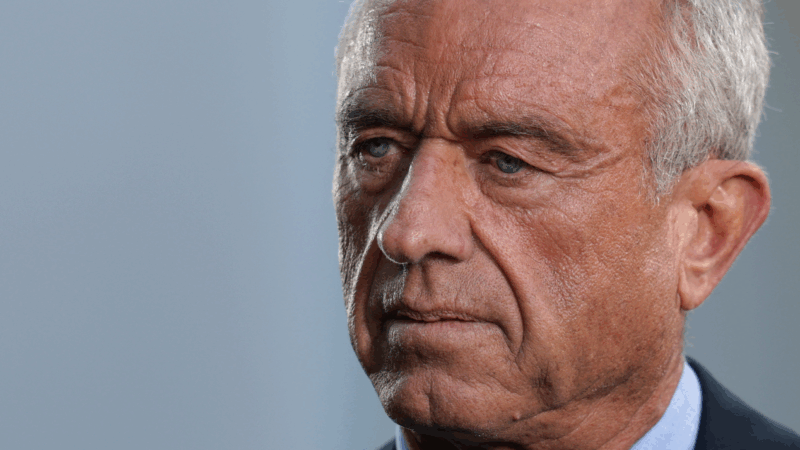The Justice Department sues Maine and Oregon, ratcheting up demands for voter data
The Department of Justice is escalating its demands for sensitive elections data from voting officials, announcing lawsuits against two Democratic-controlled states who have thus far rebuffed the department’s requests.
The DOJ is suing Oregon and Maine and those states’ secretaries of state in an effort to gain access to each state’s voter registration list, including personal information such as partial Social Security numbers.
The department has asked for sensitive voting data from numerous states; Oregon and Maine are the first to be sued.
“If the President wants to use the DOJ to go after his political opponents and undermine our elections, I look forward to seeing them in court,” Oregon Secretary of State Tobias Read, a Democrat, said in a statement. “I stand by my oath to the people of Oregon, and I will protect their rights and privacy.”
In the lawsuits, the Justice Department says it hasn’t been given complete answers or enough supporting evidence in the form of raw data to determine if the states are following federal law when it comes to maintaining accurate registration lists.
“States simply cannot pick and choose which federal laws they will comply with,” Harmeet Dhillon, head of the DOJ’s Civil Rights Division, said in a statement when the lawsuits were announced Tuesday. “American citizens have a right to feel confident in the integrity of our electoral process, and the refusal of certain states to protect their citizens against vote dilution will result in legal consequences.”
Voter list maintenance is impossible to do perfectly in real time as thousands of Americans move and die every day, and since states have constitutional authority to oversee their own elections, courts have maintained a relatively low bar for what states need to do to satisfy the “reasonable” effort legally required to keep lists up-to-date.
That standard has long frustrated election integrity hawks on the right who advocate for more transparency into list-cleaning procedures and more aggressive list purging. To back the need for more stringent list maintenance, many of those groups have pushed misleading information about widespread fraud in elections.
The head of the Justice Department’s Voting Section, Maureen Riordan, previously worked for a conservative law firm that has sued numerous states alleging list-maintenance violations, and Dhillon has also pushed false election fraud claims.
In declining the DOJ’s request, Maine Secretary of State Shenna Bellows said she had grave concerns about data security, among other things.
“The Department of Justice hasn’t shown any good reason for its fishing expedition for sensitive voter information on every American,” said Bellows, a Democrat who’s also running for governor. “The federal government has a terrible track record keeping private data safe.”
Requests from the federal government for voter data have traditionally been a nonstarter for state officials: Then-Republican Secretary of State of Mississippi Delbert Hosemann famously said the first Trump administration could “go jump in the Gulf of Mexico” in response to similar asks in 2017 (and Bellows echoed that line earlier this year).
Many election officials are concerned with what the current Trump administration plans to do with voter data.
NPR reported last week that the Trump administration said it has run more than 33 million voter records through a citizenship verification tool at the Department of Homeland Security, while providing next to no information about the accuracy or security of the tool.
In a meeting with voting officials this summer, DHS officials tried to assuage concerns that the tool was linked to the DOJ requests states were receiving. “We don’t want your data. We don’t want your lists,” the DHS officials said, according to one attendee.
But DHS indicated in recent statements to other news outlets that it is collaborating with the DOJ to share data.
When asked explicitly whether the DOJ planned to run the voter rolls it gets from states through the tool, a Justice Department spokesperson who declined to be named only said the requests were legal and that data would be “screened for ineligible voter entries.”
Other states have also declined the Justice Department’s requests for data or indicated they may decline. It’s unclear whether the DOJ plans to sue them as well.
Opinion: Remembering Ai, a remarkably intelligent chimpanzee
We remember Ai, a highly intelligent chimpanzee who lived at the Primate Research Institute of Kyoto University for most of her life, except the time she escaped and walked around campus.
The near death — and last-minute reprieve — of a trial for an HIV vaccine
A trial was about to launch for a vaccine that would ward off the HIV virus. It would be an incredible breakthrough. Then it looked as if it would be over before it started.
Bessemer data center developer to request rezoning for additional 900 acres
The city’s attorney informed council members of the request on Tuesday, warning that there may be media scrutiny.
Is RFK Jr.’s Administration for a Healthy America — AHA — in the works or not?
The Administration for a Healthy America is RFK Jr.'s plan to tackle chronic disease, addiction and other persistent problems. But so far it's not being set up like previous new agencies.
Major plumbing headache haunts $13 billion U.S. carrier off the coast of Venezuela
The crew of USS Ford is struggling to handle sewage problems on board the Navy's newest carrier.
Events in Minneapolis show how immigration enforcement has changed. What’s the impact?
Minneapolis is at the center of sweeping, evolving federal immigration push. It demonstrates how different immigration enforcement is under Trump's second administration - and raises questions about the lingering effects on local communities and law enforcement.






